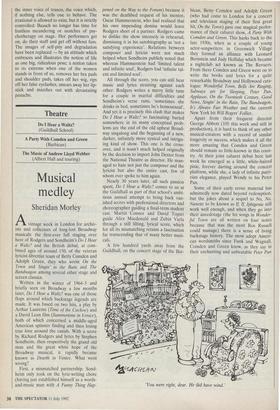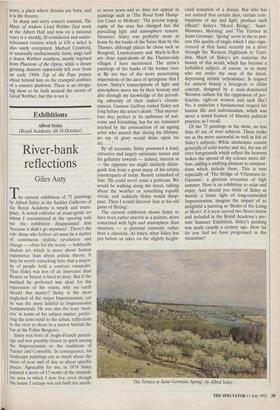Theatre
Do I Hear a Waltz? (Guildhall School) A Party With Comden and Green (Barbican) The Music of Andrew Lloyd Webber (Albert Hall and touring)
Musical medley
Sheridan Morley
Avintage week in London for archiv- ists and collectors of long-lost Broadway musicals: the first-ever full staging over here of Rodgers and Sondheim's Do I Hear a Waltz? and the British debut, at com- bined ages of around 150, of the veteran lyricist-librettist team of Betty Comden and Adolph Green, they who wrote On the Town and Singin' in the Rain and The Bandwagon among several other stage and screen classics.
Written in the winter of 1964-5 and briefly seen on Broadway a few months later, Do I Hear a Waltz? was one of those flops around which backstage legends are made. It was based on two hits, a play by Arthur Laurents (Time of the Cuckoo) and a David Lean film (Summertime in Venice), both of which concerned a middle-aged American spinster finding and then losing true love around the canals. With a score by Richard Rodgers and lyrics by Stephen Sondheim, then respectively the grand old man and the great white hope of the Broadway musical, it rapidly became known as Dearth in Venice. What went wrong?
First, a mismatched partnership. Sond- heim only took on the lyric-writing chore (having just established himself as a words- and-music man with A Funny Thing Hap-
pened on the Way to the Forum) because it was the deathbed request of his mentor, Oscar Hammerstein, who had realised that his own impending demise would leave Rodgers short of a partner. Rodgers came to dislike the show intensely in rehearsal, dismissing it in his autobiography as 'not a satisfying experience'. Relations between composer and lyricist were not much helped when Sondheim publicly noted that whereas Hammerstein had 'limited talent and infinite soul', Rodgers had 'infinite tal- ent and limited soul'.
All through the score, you can still hear music and lyrics straining against each other: Rodgers writes a merry little tune for a couple in marital difficulties and Sondheim's verse runs, 'sometimes she drinks in bed, sometimes he's homosexual'. And yet it is precisely this clash that makes Do I Hear a Waltz? so fascinating: buried somewhere in its many conceptual prob- lems are the end of the old upbeat Broad- way singalong and the beginning of a new, darker, infinitely more cynical and intrigu- ing kind of show. This one is the cross- over, and it wasn't much helped originally by the decision to import John Dexter from the National Theatre as director. He man- aged to hate not just the composer and the lyricist but also the entire cast, few of whom ever spoke to him again.
Nearly 30 years later, all such passion spent, Do I Hear a Waltz? comes to us at the Guildhall as part of that school's ambi- tious annual attempt to bring back van- ished scores with professional directors and choreographer guiding a final-term student cast. Martin Connor and David Toguri guide Alice Macdonald and Zubin Varla through a still lilting, lyrical score, which for all its mismatching retains a fascination far transcending that of many better musi- cals.
A few hundred yards away from the Guildhall, on the concert stage of the Bar-
bican, Betty Comden and Adolph Green (who had come to London for a concert and television staging of their first great hit, On the Town) gave one magical perfor- mance of their cabaret show, A Party With Comden and Green. This harks back to the late 1930s, when as a couple of young actor-songwriters in Greenwich Village they formed an alliance with Leonard Bernstein and Judy Holliday which became a nightclub act known as The Revuers. From there Comden and Green went on to write the books and lyrics for a quite remarkable Broadway and Hollywood cata- logue: Wonderful Town, Bells Are Ringing, Subways are for Sleeping, Peter Pan, Applause, On the Twentieth Century, Good News, Singin' in the Rain, The Bandwagon, It's Always Fair Weather and the current New York hit Will Rogers' Follies.
Apart from their frequent director George Abbott (105 this week and still in production), it is hard to think of any other musical-creators with a record of similar longevity or success, which makes it all the more amazing that Comden and Green should remain so little-known in this coun- try. At their joint cabaret debut here last week he emerged as a little, white-haired pixie, forever darting around the concert platform, while she, a lady of infinite patri- cian elegance, played Wendy to his Peter Pan.
Some of their early revue material has admittedly now dated beyond redemption, but the jokes about a sequel to No, No, Nanette to be known as If If Iphigenia still work well enough, and when they go into their anecdotage (the hit songs in Wonder- ful Town are all written on four notes because that was the most Ros Russell could manage) there is a sense of living backstage history. The most adept Ameri- can wordsmiths since Funk and Wagnall, Comden and Green know, as they say in their enchanting and unbeatable Peter Pan 'You were right, dear. He did have wind.'
score, a place where dreams are born, and It is the theatre.
In sharp and sorry concert contrast, The Music of Andrew Lloyd Webber (last week at the Albert Hall and now on a national tour) is a shoddy, ill-considered and under- rehearsed venture which at £30 a ticket is also vastly overpriced. Michael Crawford, in unusually uncharismatic form, sings half a dozen Webber numbers, mostly reprised from Phantom of the Opera, while a dozen gyrating dancers apparently left over from an early 1960s Top of the Pops prance about behind him on the cramped confines of a concert platform. There is an intrigu- ing show to be built around the scores of Lloyd Webber, but this is not it.



















































 Previous page
Previous page